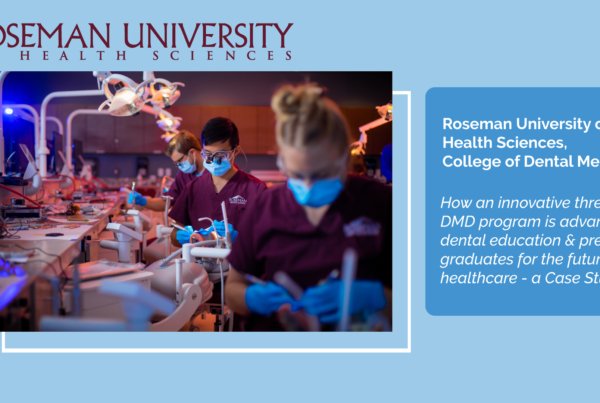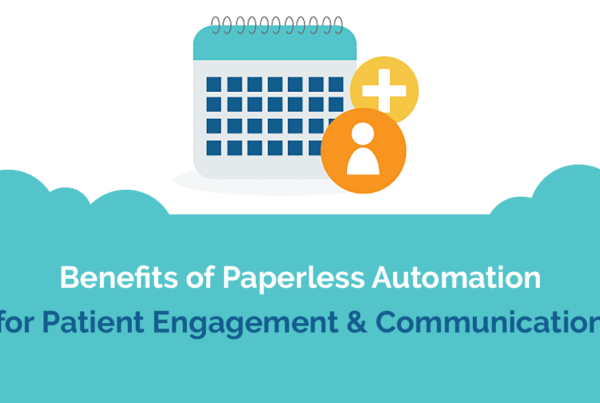Summary: You’ve probably heard of the word ‘interoperability’, but did you know it offers big benefits to your healthcare and dental organization? See the Top 5 benefits of interoperability.
A buzz word has recently gained traction when discussing the integration capabilities of healthcare software; interoperability. But what does interoperability mean, and how does it benefit your healthcare organization?
Watch our webinar on interoperability where we discuss the 5 benefits outlined below:
Interoperability Definition:
in·ter·op·er·a·bil·i·ty
in(t)ərˌäp(ə)rəˈbilədē/ | noun
the ability of computer systems or software to exchange and make use of information.
What does interoperability mean in regards to Healthcare?
Healthcare Information and Management Systems Society (HIMSS) defines interoperability in healthcare as “the ability of different information technology systems and software applications to communicate, exchange data, and use the information that has been exchanged.”
To simplify; it’s the sharing and interpreting of patient information across an entire system.
Interoperability ensures that your healthcare system not only collects and shares patient data with healthcare providers, but presents that data in a way that clearly demonstrates the cause and effect of patient treatments. What are the benefits of interoperability in the healthcare and dental industry?
1. Reduces Errors and Improves Efficiency
Without interoperability, many systems still require the manual input, reporting, and analysis of data which, in turn, can create opportunity for errors. The integration of software to a primary EHR system allows for an easy, and secure, flow of information. No more repetition, simply a whole-health record.
2. More Accurate Reporting (Data and Trends)
Your healthcare system only gives what it gets, meaning however much information you are willing to put into your system, is how much data you can retrieve. With that ideology, it would serve to say that the interoperability of your system is crucial for improving your reports and obtaining high level analysis of trends. Adopting interoperable digital health technologies allows for a steady-stream of data to populate into your EHR from a variety of advanced tools and systems. With that data comes a complete whole-health picture of your patients, and in-turn the improved accuracy of reporting. In the long-term, these detailed reports will allow for review of high-level trends.
3. Increases the Value of ‘Best-of-Breed’ Products
The healthcare industry adopts technologies that work for their core needs. These best-of-breed solutions work so well for the healthcare and dental industry because they were made specifically for their needs and uphold high regulatory requirements. Best-of-breed products are also including interoperability in their pre-existing systems by securely expanding data sharing opportunities, and partnering with advanced technology systems. For example, in the academic dental industry, Exan Software partners with companies such as 3D-Imaging and Online Payments, finding ways to improve both the doctor and patient experience.
4. Better Access to More Complete Patient Records
Patients go to a variety of places for their healthcare needs, so we cannot expect one system to capture all their data, nor can we expect one system to work for each industry; healthcare, dental etc. What we can expect is interoperability of these systems to connect with each other, and securely share data, so that we can populate a more complete patient record. Our goal isn’t to have a software that does everything, our goal is to have a software that can connect to everything.
5. Improves Patient Safety
With the knowledge that patient’s data lives in a variety of places, it seems almost inevitable that without a complete patient record, errors can be made, and the patients’ health and safety can be put at risk. Interoperability ensures your systems, in addition to patient cooperation, provide the best patient-care experience possible. AT Still University is a prime example of an organization focused on whole-person health. A complete EHR ensures things such as allergies or pre-existing conditions are provided before a patient sits down at their dental school. Watch how they’re using axiUm Ascend.
In conclusion
When it comes to interoperability, it’s clear that it’s more than just a buzz word. Remember the benefits of interoperability when the word inevitably becomes topic of conversation at your organization’s next board meeting.
Do you know another benefit of interoperability in the healthcare industry, or do you have an integration idea for Exan Software? Email us at blog@exansoftware.com





